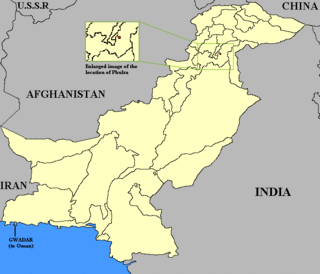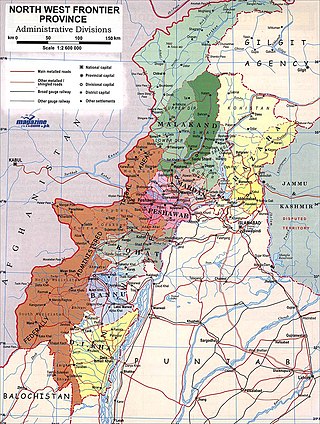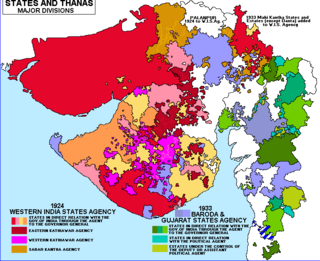
A princely state was a nominally sovereign entity of the British Indian Empire that was not directly governed by the British, but rather by an Indian ruler under a form of indirect rule, subject to a subsidiary alliance and the suzerainty or paramountcy of the British crown.

The Central India Agency was created in 1854, by amalgamating the Western Malwa Agency with other smaller political offices which formerly reported to the Governor-General of India. The agency was overseen by a political agent who maintained relations of the Government of India with the princely states and influence over them on behalf of the Governor-General. The headquarters of the agent were at Indore.

The Provincially Administered Tribal Area (PATA) was the former administrative subdivision of Pakistan designated in the Article 246(b) of the Constitution of Pakistan. No Act of Provincial Assembly can be applied to PATA whereas the Governor of the respective province has a mandate parallel to the authority President of Pakistan has over Federally Administered Tribal Areas. In 2018, a Twenty-fifth Amendment to the Constitution of Pakistan merged PATA, as well as FATA into full control of the Khyber-Paktunkhwa government, thus the PATA designation has no legal standing in the future of Khyber-Paktunkhwa.

Amb or the State of Amb was a princely state in the present day Khyber Pakhtunkhwa region of Pakistan. Together with Phulra, it was known as Feudal Tanawal ruled by Tanoli tribe. A Royal Tenure start from Timurid Empire and end on Last Nawab Muhammad Farid Khan Tanoli. Amb was only powerful state incorporated in Pakistan with armed civilized military of 12,000 men, 300 Howitzer with their own manufacturing arms factory, today part of the Pakistan Army. Amb had a influence control roots in Swat, Dir and Chitral. A gaining of powerful roots of Amb military start from Second Anglo-Sikh War when East India Company provide military equipment to Jehandad Khan Tanoli to fight against Sikh, and then next British Empire in Second anglo-Afghan War. At the end of December 1947, the Nawab of Amb state acceded to Pakistan while retaining internal self-government. Amb continued as a princely state of Pakistan until 1969, when it was incorporated into the North West Frontier Province.

Ghazi Khan Umra Khan of Jandol, also called "The Afghan Napoleon", was a Pashtun chief on the north-western frontier of British India, who was chiefly responsible for the Chitral Expedition of 1895. He was the Khan of Jandol and captured the state of Dir and reigned as its Nawab from 1890 to 1895. Umra briefly occupied Swat, Chitral and Bajaur. He also took over Kunar and Kafiristan regions of Afghanistan.

Rewa Kantha was a political agency of British India, managing the relations of the British government's Bombay Presidency with a collection of princely states. It stretched for about 150 miles between the plain of Gujarat and the hills of Malwa, from the Tapti River to the Mahi River crossing the Rewa River, from which it takes its name.

The Deccan States Agency, also known as the Deccan States Agency and Kolhapur Residency, was a political agency of India, managing the relations of the Government of India with a collection of princely states and jagirs in western India.

A salute state was a princely state under the British Raj that had been granted a gun salute by the British Crown ; i.e., the protocolary privilege for its ruler to be greeted—originally by Royal Navy ships, later also on land—with a number of cannon shots, in graduations of two salutes from three to 21, as recognition of the state's relative status. The gun-salute system of recognition was first instituted during the time of the East India Company in the late 18th century and was continued under direct Crown rule from 1858.

Dir is a region in northwestern Pakistan in the Khyber Pakhtunkhwa, in the foothills of the Himalayas. Before the independence of Pakistan, Dir was a princely state, and it remained so until 1969 when it was abolished by a presidential declaration, and the Dir District was created the following year. The area covers 5,280 square kilometres. In 1996 Dir district was officially divided into Lower Dir District and Upper Dir District.

Upper Dir District is a district located in the Malakand Division of Khyber Pakhtunkhwa province of Pakistan. The city of Dir is its district headquarter. Geographically, it is located in the northern part of Pakistan. It borders with the Chitral district on the north, Afghanistan on the northwest, the Swat district on the east, and the Lower Dir district on the south. It shares 40 to 50 kilometers border with Afghanistan.

Dir was a princely state in a subsidiary alliance with the British Raj, located within the North-West Frontier Province. Following the Partition of British India, Dir remained independent and unaligned until February 1948, when the Dominion of Pakistan accepted its accession.

Phulra or the State of Phulra was a Muslim princely state in the days of British Raj and ruled by the Tanoli tribe, located in the region of the North West Frontier to the east of the nearby parent princely state of Amb (Tanawal).

The Punjab States Agency was an agency of the British Raj. The agency was created in 1921, on the model of the Central India Agency and Rajputana Agency, and dealt with forty princely states in northwest India formerly dealt with by the Province of Punjab.

The Malakand Agency was one of the agencies in the North West Frontier Province of British India and later of Pakistan until 2010. It included the princely states of Chitral, Dir and Swat, and an area around the Malakand Pass known as the Malakand Protected Area. The largest city in the area was Mingora, while the three state capitals were Chitral, Dir, and Saidu Sharif. In 1970, following the abolition of the princely states, the agency became the Malakand Division, which was divided into districts, one of which was the Malakand Protected Area, known as Malakand District. In 2000 the Malakand Division was abolished. Despite the constitutional changes since 1970, the expression Malakand Agency is still used, sometimes of the entire area of the former Agency, but more often of Malakand District.
The Princely States of Pakistan were princely states of the British Indian Empire which acceded to the new Dominion of Pakistan between 1947 and 1948, following the partition of British India and its independence.

Baroda and Gujarat States Agency was a political agency of British India, managing the relations of the British government of the Bombay Presidency with a collection of princely states.

The Baroda, Western India and Gujarat States Agency was an agency of the Indian Empire, managing the relations of the Provincial Government of the Bombay Presidency with a collection of princely states.
His Highness Sir Nasir ul-Mulk KCIE was the eldest son of Mehtar Shuja ul-Mulk, who succeeded him in 1936. He ruled the princely state of Chitral from 1936 to 1943.














